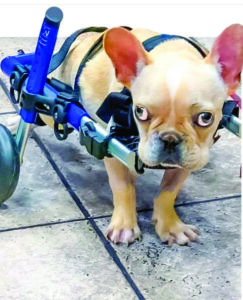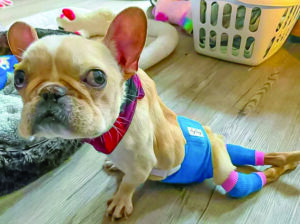By Dr. Beth Leermakers
North Texas animal advocates are rejoicing. On May 11, the Dallas City Council voted unanimously to pass the Humane Pet Store Ordinance. The ordinance will ban the sale of puppies and kittens in Dallas pet stores and help prevent cruel breeding practices.

Photos courtesy of Patti OConnell Dawson
“Since January 2021, we have been working tirelessly to pass this ordinance to close the puppy mill pipeline to Dallas to stop hundreds of sick puppies from being shipped from out-of-state puppy mills,” said Stacy Sutton Kerby, director of government relations at Texas Humane Legislation Network (THLN). “Over the years, the THLN helpline has regularly received complaints about Dallas retail stores selling sick or unhealthy puppies. We are so grateful to Chair Adam Bazaldua, Mayor Pro Tem Chad West, the entire Quality of Life, Arts, & Culture Committee and city staff for their support and attention to such a vital animal welfare issue right here in our community.”
Patti OConnell Dawson, president and founder of Dallas Dog – Rescue. Rehab. Reform. (Dallas Dog – R.R.R), spoke at Wednesday’s City Council meeting, accompanied by Harold, a puppy mill survivor. Harold is a 2-and-a-half-year-old French bulldog whose original owner purchased him at Petland for six or seven thousand dollars. When his owner brought him home from the pet store, Harold was sick and had already received seven antibiotics since he was three weeks old. His new mother had to continue his treatment with her vet. Then Harold suddenly lost the ability to use his hind legs. He was diagnosed with a congenital (i.e., hereditary) condition called Kyphosis (curvature of the spine), which left him without any feeling or mobility in his legs. Harold now relies on a wheelchair to get around. The vet recommended notifying the breeder, since Kyphosis will be passed down to other puppies from the affected parent. Harold also has several other congenital disorders that result from overbreeding and poor genetics: megaesophagus (requiring him to be fed upright like a baby), hydrocephalus and an enlarged palate. When Harold’s owner could no longer care for him, the pup was rescued by Dallas Dog – R.R.R.
Harold’s treatment regimen is extensive and expensive. He eats small amounts of prescription food three to four times a day — in the sink so he stays level and upright, preventing him from regurgitating his food and aspirating. Harold gets subcutaneous fluids, two injections and four oral medications daily. He wears diapers. Harold’s monthly costs range from $275-$350 per month.

Pet store and internet puppies often come from puppy mills — “factory farms” for dogs, where profit takes priority over the health, comfort and welfare of the dogs, according to Best Friends Animal Society.
Puppy mills have:
Tiny cages. Puppy mill breeders keep hundreds of dogs in small, stacked, wire-floored crates or in outdoor pens exposed to the elements. The minimal legal size for breeding facility cages is 6” bigger than the dog on all sides. Imagine barely being able to turn around, let alone move freely.
Filthy conditions, which lead to disease. Dirty kennels encourage the spread of worms, upper respiratory infections, pneumonia and parvovirus (a deadly disease that is very expensive to treat). Puppies often wind up in pet stores with one or more of these life-threatening conditions.
Poor veterinary care. Because it’s expensive and time-consuming, puppy mill owners may limit or skip checkups, vaccines and/or care when they’re sick.
No walks or human interaction. Puppy mill mothers and fathers spend their lives in those tiny cages, without any socialization with people or other dogs. They may pace back and forth in their cages, bark nonstop, cower or appear entirely shut down.
Nonstop breeding. Female dogs are bred constantly, even if they are sick, injured, exhausted or have genetic traits that could damage their puppies.
A representative for the Dallas Petland store stated that the store obtains its dogs from licensed, reputable breeders, not puppy mills. Unfortunately licensed breeders can be puppy mills. Although the United States Department of Agriculture (USDA) regulates most breeders who sell puppies online and to pet stores, the minimal standards imposed on breeders don’t promote responsible breeding or ensure healthy puppies. For example, it’s legal for licensed breeders to own 1,000 or more dogs, keep them in very small cages for their entire lives and breed them as often as possible.
Government standards aren’t designed to be sure the dogs have good lives; they only require the bare minimum of care. Plus, there are only a few inspectors in each state for all of the state’s licensed breeding facilities. In June 2021, the ASPCA sued the USDA for failing to enforce the Animal Welfare Act (AWA), letting violations go unreported and unpunished. Goldie, a golden retriever at an Iowa licensed breeding facility, had to be humanely euthanized due to severe neglect and abuse (protruding bones and zero body fat). The USDA allowed Goldie to suffer and deteriorate for months, despite being aware of her emaciated condition and having the authority (and responsibility) to halt the abuse.
On December 1, 2021, six bipartisan U.S. Representatives introduced a bill that would amend the AWA in an effort to finally end the horrific conditions in commercial dog breeding facilities. Named “Goldie’s Act” in honor of Goldie, the bill would eliminate loopholes in USDA enforcement practices that allow AWA violations to go unreported.
How You Can Help Fight Puppy Mills
1. Adopt, don’t shop. When you adopt, you’re refusing to support puppy mills, and you’re saving a life. More than 950 dogs and cats are killed in U.S. shelters every day because they don’t have homes. Dallas/Fort Worth area shelters are full now, with shelter staff forced to euthanize healthy, adoptable dogs to make room for incoming strays and owner surrenders. Purebred dogs wind up in shelters and rescue groups. Visit petfinder.org to find rescue dogs in your area.
2. Visit bestfriends.org to learn more about puppy mills and get the tools and resources you need to help fight them.
“The Humane Pet Store Ordinance will encourage pet store owners to work with rescues, shelters and local breed-specific clubs/rescues to find homes for the many animals in need across Texas,” said Dawson. “Stopping the pipeline of puppy mills, the ordinance will help to rehome the thousands of animals who need loving homes and families. It will protect families by preventing them from heartbreak after purchasing unhealthy puppies. Additionally, it will help shield Texans from deceptive practices (such as surprisingly high interest rates when financing a puppy) and exorbitant vet bills.”
Thank you to the Dallas City Council for taking action to protect dogs and the people who love them!
